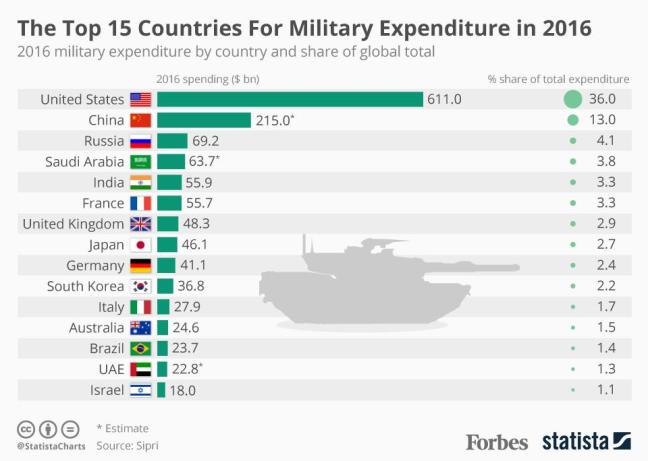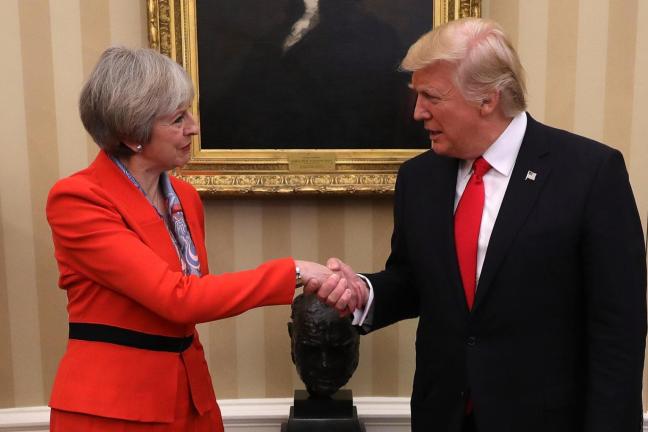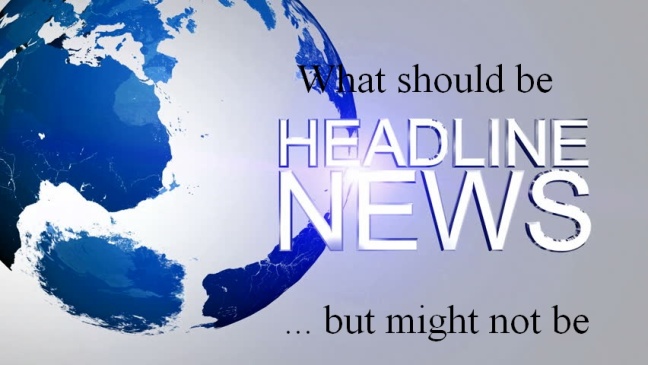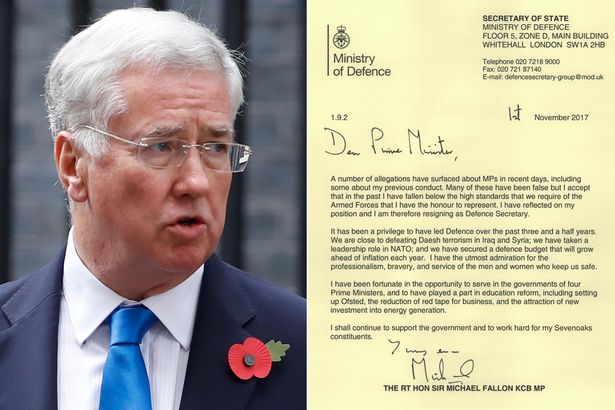This morning’s big BBC headline was “Trump hits out at May over Tweet Criticism.”
Yesterday we had “Donald Trump wrong to share far-right videos – PM“
And before that, a couple of days ago, it was “Democratic leaders cancel meeting with Trump after Twitter attack.” Then there was “Trump calls for boycott of television network CNN: tweet“. And there was also an attack on NBC for putting out ‘Fake News’.
And that’s just in the past week.
Personally, I am surprised that anyone still expresses outrage at Trump’s tweets. It seems that the more obvious reactions are to groan, or shake one’s head sadly, or even to just laugh.
That tweet
But back to the tweet that traumatised Theresa. What was the problem?
A Downing Street spokesman said:
“It is wrong for the President to have done this. Britain First seeks to divide communities through their use of hateful narratives which peddle lies and stoke tensions. They cause anxiety to law-abiding people. British people overwhelmingly reject the prejudiced rhetoric of the far-right which is the antithesis of the values that this country represents: decency tolerance and respect.”
Similarly, Foreign Secretary Boris Johnson tweeted: “Britain First is a divisive, hateful group whose views are not in line with our values”, and the Archbishop of Canterbury Justin Welby said it was “deeply disturbing” that Mr Trump had “chosen to amplify the voice of far-right extremists”.
What is interesting is that most people are objecting not to the point that Trump is seeking to make, per se (though they may well find it objectionable) – but to the group that originally made it. They feel that he is giving it credibility.
How should we respond?
I for my part, am inclined to welcome these tweets from Trump – even if without much enthusiasm.
Let me explain. Britain First are a tiny, marginal group. To say that they represent no threat to anyone would not be true, but they strike me as being in the same category as a gang of car thieves. Yes, they do represent a threat to some people, but their threat to the country as a whole is pretty negligible. There is no sign whatsoever that Britain First and its message, are having, or will have, any influence in the corridors of power in Britain – either in politics or the media. Like the bogeyman threat of Islamic terrorism, they are a paper tiger, to use an old Chinese proverb.
Islamic terrorism and groups like Britain First may terrify millions, and they may be what politicians want us to worry about, but they are the least of Britain’s problems.
Hence I am not remotely concerned that Trump may amplify the voice of Britain First. I don’t think that he is adding much to their credibility. Rather, what he is doing, is further detracting from his own credibility. And that, I think, is an excellent thing. The more Donald Trump does things that show that he is not to be taken seriously, the better it is for our world.
And that is because it would be a great thing if people took the utterances and statements that come out of the White House a lot less seriously. I say that because a lot of what is coming out of the White House is seriously dangerous.
Things that actually matter
Let’s start with Iran. Donald Trump is doing his best to ratchet up tension with Iran, and using the issue of Iranian compliance with that Joint Comprehensive Plan of Action (the deal which allows Iran to have a nuclear power program, but not do do anything toward developing nuclear weapons) to do so. The International Atomic Energy Agency has repeatedly said that Iran is in full compliance. Donald Trump keeps on making wild accusations against Iran, and saying that America should pull out of the agreement
To quote Daniel Larison,
Iran has been in compliance with the requirements of the nuclear deal in nine consecutive reports issued by the IAEA. Reports of Iranian compliance have become so predictable by now that they scarcely seem newsworthy, but it is worth remembering how certain opponents of the deal were that this would not happen. Opponents of the agreement were sure that Iran would cheat and fail to meet its obligations, and they insisted again and again that there was no point in making a deal with a regime that wouldn’t honor its commitments. For the ninth time in a row, the deal’s opponents have been proved completely wrong on this point.
Iran has been consistently adhering to the restrictions imposed by the JCPOA, so now we hear from critics of the deal that their compliance isn’t enough. Iran hawks no longer claim to care about cheating by Tehran, and instead express their horror that Iran is abiding by the terms of the agreement. These complaints serve as a reminder that no deal will ever satisfy these critics, because they are opposed to any agreement that reduces tensions with Iran and removes a pretext for war.
That is much more dangerous than re-tweeting the tweets of a marginal British political group.
Then there is Lebanon. I’ve already written about the extraordinary resignation of Prime Minister Saad Hariri. It seems pretty clear that what happened was that the Saudi government basically summoned him to Saudi Arabia, put him in a TV studio, and ordered him to read a resignation statement. This was was effectively the kidnapping by the Saudi government of the prime minister of another sovereign state. If any other country had done this, there would have been international uproar, but the the Western political establishment treated this, at least in public, as if it was no big deal. But what is much worse is that it appears that the Saudi plan was known in advance and approved by the White House.
Again, that is much more dangerous than retweeting the tweets of a marginal British political group.
And then there is Yemen. A few weeks ago, after the bombing of a market and a hotel in Yemen by the Saudi-led coalition, Daniel Larison wrote:
This is just the latest in a long string of indiscriminate attacks in civilian areas by the coalition. Saada province has suffered some of the worst bombing over the last two and a half years, especially after the coalition illegally designated the entire area a military target. Other civilian targets that have been hit over the years have included schools filled with children, health clinics, and civilian homes, among others. When the U.S. fuels and arms the Saudis and their allies, this is what our government is enabling in Yemen. These are all violations of international law, and by helping to make them possible the U.S. knowingly makes itself complicit in the commission of war crimes. That must end if there is to be any hope of halting the war in the near future.
I think that being complicit in the commission of war crimes by a government that is responsible for the deaths of tens of thousands of civilians is a lot more serious than retweeting the tweets of a marginal British political group.
The real problem
Donald Trump is pursuing policies in the Middle East which have been responsible for thousands of civilian deaths – and which may cause the deaths of a lot more. These things are seriously worrying. If Trump were president of a small central African state, it wouldn’t be a major problem. But he isn’t. He is president of the wealthiest, most influential, and most powerful country in the world – so powerful that it’s military budget dwarfs that of every other country in the world.

The more that he discredits himself with his tweets, the better. One would like to hope that between the Saad Hariri fiasco, and the utter nonsense that Trump has been spouting about Iran, that no other world leaders would take him seriously. Sadly, some still seem to. Maybe, just maybe, these tweets will help discredit him further. If so, they might prove to make a contribution to peace and stability in the world.
Alas, while I think that will happen to some extent, I don’t think this is going to happen nearly as much as it should.
Of pigs and men
And one of the main reasons for that is that in America, and even outside America, a remarkable number of political leaders seem to be broadly supportive of the policies that Trump is pursuing in the Middle East. A lot of people think that simply changing the president would solve the problem. It wouldn’t. A lot of Trump’s views are widely shared by the political establishment in America – not just by those members of his own party who don’t like him, but also by Democrats. Look it up yourself – there has been bipartisan support for Saudi Arabia’s policy in Yemen over the past two years, with very little criticism; there has been remarkably little criticism of Saudi involvement in the resignation of Hariri, and surprisingly little criticism of Trump’s anti-Iranian rhetoric. In many ways, where Trump is at his worst, he is simply taking the establishment line.
The Democrats and the Republicans may have a lot of differences, but a lot of them are pretty minor. And so often, their political behaviour is simply tribalistic. I recently listened to an interview with a long serving Congressman who spoke about how he was convinced that whether his fellow members of Congress would vote for or against a measure depended on whether the president who proposed it was a member of their own party or not. If Clinton proposed it, they would vote one way, if Bush proposed it, they would vote the other. If Trump proposed it, their response would be the opposite of the response they would give if Obama proposed it. And this isn’t just the case for members of congress; it’s also true of a lot of ordinary Americans.
There is a meme that came out last year which summed up this political tribalism well (and my view of the election!)

And of course this is not just true in America; it’s true in plenty of other countries as well. But sometimes I do wonder if it is even more true in America!
And it blinds people to the real problem. The real problem is not that Donald Trump was elected president last year. The real problem, it seems to me – and as I pointed out when he was elected – is that in the American presidency, far too much power is concentrated in the hands of one person. And that is always potentially dangerous, and is a seriously bad idea. And almost nobody is talking about it. (But hey, that’s what this blog does – raises issues than almost nobody is talking about.)
So politicians continue to argue among themselves about trivia. But often, they are a lot more similar to their opponents that one might think. Orwell captured this brilliantly in Animal Farm, in the scene in which the animals on the farm watch a meeting between the pigs and the men: “The creatures outside looked from pig to man, and from man to pig, and from pig to man again; but already it was impossible to say which was which.“
They realised that for all the pig’s anti-human rhetoric, they were just like the men. The new political masters claimed to be completely different from the old ones; but in everything that really counted, they were just the same.
I can’t help reflecting on some words in the Bible, from in the opening verses of Psalm 2.
“Why do the nations rage and the peoples plot in vain? The kings of the earth set themselves, and the rulers take counsel together, against the LORD and against his Anointed, saying, “Let us burst their bonds apart and cast away their cords from us.””
Basically, it is saying that the rulers of the world have all joined together. And what do they want to do? They want to be free from God – in other words, free from his standards, free to do whatever they want, whether it is morally right or morally wrong. They want to be above the law.
Sadly, history shows that that is really what (almost) all the world’s rulers have in common – a desire for power – to do whatever they want, whatever they think is right. As Lord Acton said, “All power corrupts, and absolute power corrupts absolutely.”
And so it is, for all practical purposes, with Donald May and Theresa Trump – or whatever they’re called.
But as for me, I’m with George Orwell and Lord Acton.
And with what the Bible says.









